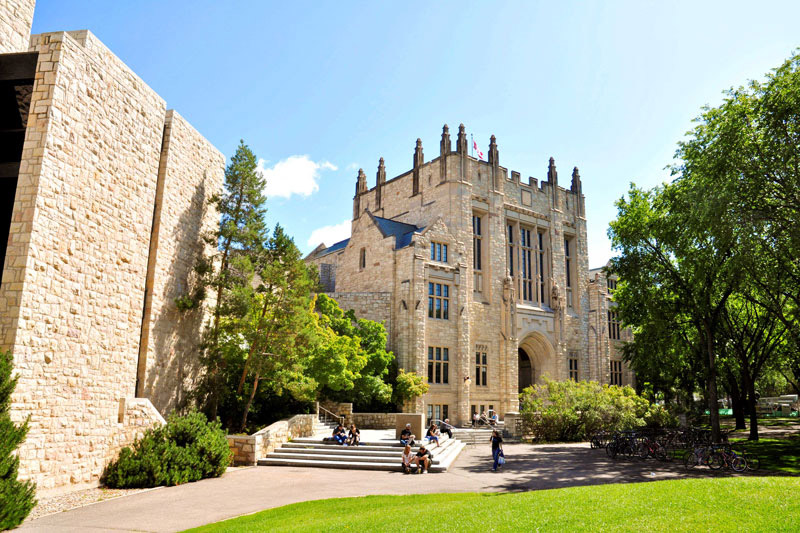
Feeling ‘the USask spirit’
Award-winning graduate and lifelong learner Dr. Idowu Mogaji (GPSC’21, PhD’23) knew the University of Saskatchewan was the right fit for her after seeing the Saskatoon campus in a YouTube video
By Shannon BoklaschukUniversity of Saskatchewan (USask) graduate Dr. Idowu Mogaji (GPSC’21, PhD’23) has travelled around the world throughout her learning journey.
Mogaji, who is originally from Nigeria, was living and working in Timmins, Ontario, when she saw a YouTube video that showcased USask and its Saskatoon campus. She was instantly interested in the university.
“That just attracted me. Before that, I knew there was a province called Saskatchewan—but I didn’t really pay attention to it,” she said. “That ad really attracted me, and immediately I stopped the YouTube (video) and I went to Google and I searched for ‘University of Saskatchewan’ and found the website. I went to the website, and I just felt it was the right place.”
At the time she viewed the video, Mogaji was dreaming of completing a PhD after earning her Master of Education degree at the University of Manchester in the U.K. in 2010 and her Bachelor of Education degree at the University of Ibadan in Nigeria in 2007. Mogaji had held onto that doctoral dream even when she returned to Nigeria after living in the U.K. and experienced pushback from people who felt she should commit to being a more “traditional” woman. Still, her academic aspirations continued.
“I just thought that something was missing,” she said. “One of the decisions I made for myself was, ‘I’m going to do this.’ Fortunately, I come from a very supportive family—my immediate family. They said, ‘Do what you have to do, what makes you happy.’ ”
With additional encouragement from a friend who lived in Timmins—where Mogaji was working at Northern College—she took the leap and applied for graduate studies at USask.
After being away from university studies for nine years following the completion of her master’s degree, Mogaji worried about whether she would still fit into an academic environment. Her worries were quickly assuaged during her first—very positive—interaction with the Department of Educational Administration in USask’s College of Education, reassuring her that she was embarking on the right path.
In September 2019, Mogaji began her studies as a PhD student in the Department of Educational Administration. She aimed to build upon the skills that she had previously developed through her undergraduate degree in educational management and her master’s degree in educational leadership. Mogaji’s PhD supervisor was USask graduate Dr. Paul Newton (BMusEd’92, MEd’01, PhD’03), a professor and the head of the Department of Educational Administration. After chatting with Newton on the telephone, Mogaji again realized that studying at USask would be a great fit.
“I just knew at that moment, after speaking with him, that I was ready for this—and the rest is history,” she said.
When Mogaji first set foot on the USask campus in the late summer of 2019, she was impressed. The beauty of the campus lived up to what she had seen in the YouTube video. Mogaji decided it would be the right choice for her to live on campus, in residence, as she adjusted to her new school and her new city. She was instantly welcomed into the USask community as soon as her plane landed in Saskatoon; she was grateful that a woman she met online through a USask website offered to pick up her keys to her residence so that she would have a place to sleep for the night. The woman also drove Mogaji home from the airport and took her grocery shopping, in addition to providing Mogaji with some dishes that she had cooked in advance.
“That just tells you the spirit that comes with the university,” Mogaji said.
“I just felt blessed,” she added. “That was my very first experience when I came in, and it stayed with me forever. I still appreciate that today. That helped me learn how to pay it forward also because that was so warm. I just feel it, the USask spirit—that was what I considered it.”
As a new USask graduate student, Mogaji was eager to familiarize herself with her surroundings. Walking around the Bowl offered her an opportunity to appreciate the university’s architecture, and the USask campus reminded her of studying in the U.K. and the buildings there.

“It is just a beautiful place,” she said.
Mogaji considers herself “a lifelong learner” who is invigorated by the ongoing pursuit of knowledge. Her passion for learning and research continued at USask, where her PhD thesis was titled Understanding the Role of Leadership Practice in the Implementation of Education for Sustainable Development. Mogaji’s outstanding research and scholarly work was recognized at USask with scholarships and awards, including the Dr. Murray Scharf Award for the National Congress on Rural Education, as well as the Wanda Young Scholarship in Doctoral Studies and a $60,000 doctoral fellowship from the Social Sciences and Humanities Research Council of Canada (SSHRC).
“I think my passion actually comes from my upbringing—specifically my mom,” she said. “My mom is the person you always have to tell, ‘You need a break, woman. Just take a break.’ I’ve been blessed with a supportive family that, even though you’re a girl child, there are no limits.”
Mogaji, who is the youngest child in her family and has two brothers and two sisters, continues to be inspired by her family, especially her mother, who is also a lifelong learner. In fact, when Mogaji’s mother visited her in Canada last year, Mogaji found herself being awakened at 3 am when her mother got out of bed to log into online classes that were taking place in Nigeria.
“It’s something that she’s passionate about,” Mogaji said.
Since receiving her PhD at USask in 2023, Mogaji has continued her educational journey. In April 2024, she completed a graduate certificate in equity, diversity, inclusion and belonging leadership from Harvard University. In March 2024, she completed an executive certificate in corporate governance and ethics from the University of Toronto Mississauga.
Since 2022, Mogaji has worked at Aurora College’s North Slave Campus in Yellowknife, Northwest Territories, where she now lives. She began her employment there as the manager of curriculum development and is now the assistant vice-president of the community and extensions division, which focuses on academic upgrading and continuing education.
“We prepare people for post-secondary life—upskilling and things like that. We also do a lot of community engagement,” she said. “My division works with 19 communities in the North outside the three campuses that we have.”
Mogaji wants everyone to feel like they belong in post-secondary spaces. With that goal in mind, she serves as the co-chair of the Equity, Diversity, and Inclusion Committee at Aurora College.
“We try to make our college an inclusive space for all, while making sure that people who walk into our college feel like they belong, that it’s a safe space for them, and they feel welcomed into the college,” she said.
Throughout her educational journey in Nigeria, the U.K., and Canada, Mogaji has learned a lot about post-secondary education systems. She is pleased that she had the opportunity to begin her graduate studies by pursuing her master’s degree in England after earning a full scholarship. The supportive learning environment at the University of Manchester made her feel welcome even though she was the only international student in her program.
Mogaji found a similar support system when she came to USask. She enjoyed working with her PhD supervisor, Dr. Paul Newton, who encouraged her and kept her focused on her aspirations and long-term goals.
“Paul was the best thing that happened to me at the University of Saskatchewan,” she said. “Paul was a blessing to my life.”
Mogaji finished her PhD at USask within three years, which she credits, in part, to the continual support that she received from Newton. She also found support from her friends and within the small “closely knit” Department of Educational Administration.
“My department, educational administration, has a special place in my heart,” she said.
Mogaji now advises students at Aurora College to think about “the big picture”—what they want to do after they complete their studies—and to always keep their life goals in mind. Even when things are challenging as a post-secondary student, there’s hope beyond the struggles and tears, she said.
Drawing from her own experiences, Mogaji encourages students to find a trusted friend or ally to confide in when things get tough. She feels that’s especially important for students who are relocating to another country and who are leaving friends and family.
“You do not need to do the journey alone. It’s important to know that the journey can be lonely, but you don’t have to be lonely in the process,” Mogaji said.
“Being in a good space mentally also helps you progress in your studies,” she added. “That’s what I capitalized on, and it’s helped me to always be in that state of mind where I can do everything that I want to do, in as much as I have the ability to do it.”
Together we will support and inspire students to succeed. We invite you to join by supporting current and future students' needs at USask.

